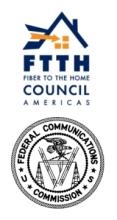Surprise! Industry Lobbyists Oppose Gigabit Community Race to the Top Proposal - Part 1
This is Part 1 in a two-part series discussing comments submitted to the FCC in response to a petition filed by Fiber-To-The-Home Council proposing a new Gigabit Community Race to the Top program.
The Fiber-To-The-Home Council (FTTHC) recently submitted a proposal to the FCC to create a Gigabit Communities "Race to the Top" program. The proposal suggests granting unclaimed portions of universal service funds (USF) to qualifying entities in small and rural markets willing to build gigabit networks. While the proposal may need some adjustments, the idea holds potential for encouraging community owned networks and we hope the FCC takes the next step by opening an official rulemaking proceeding.
What makes this proposal so promising for community networks is that it may not require grantees to qualify as “eligible telecommunications carriers” (ETCs), a technical requirement placed by the FCC on USF recipients. This requirement virtually assures that USF funds go to already established telcos and not to upstart community networks.
Instead, Race to the Top lays out its own qualifying criteria which opens the door for a broader variety of recipients, including co-ops, nonprofits and municipalities, taking a similar approach as the federal stimulus BTOP program. Furthermore, Race to the Top has the potential to improve on BTOP in one major aspect by focusing on last-mile networks, which BTOP grants largely shied away from.
The FCC comment period for this initial proposal has closed and the majority of submitted comments are supportive. But I want to highlight some of the misleading comments submitted by a few industry lobby groups - National Cable & Telecommunications Association (NCTA), Rural Broadband Association (NTCA) and USTelecom. This post will focus on the NCTA, the main lobbying apparatus of the massive cable corporations. A future post, Part 2, will discuss the others.



